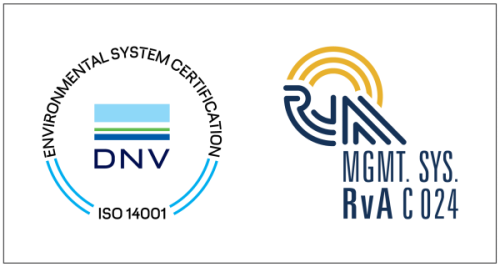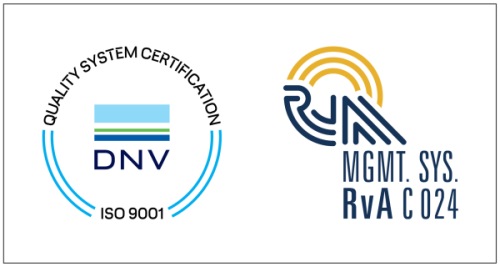Sustainability Governance
Corporate Governance
Basic Policy Regarding Corporate Governance
MARUBUN recognizes the enhancement of corporate governance as an important management issue, and strives for transparency, fairness and efficiency in its management practices, to meet the expectations of its shareholders, business partners, employees, and other stakeholders, and to increase its corporate value.
For more information on our corporate governance initiatives, please click here.
Compliance
Basic approach
In our Charter of Corporate Conduct, which presents the basic approach of the Marubun Group to its corporate activities, as well as the Action Principles, which set out the judgment criteria for officers and employees of the Marubun Group, we declare our commitment to complying with domestic and international laws and international rules, promoting sound business activities based on fair and free competition, respecting the intellectual property of others, and refraining from any form of bribery or corrupt practices.
To put this into practice, we provide annual CSR training in accordance with the Marubun Group Compliance Policy to ensure thorough compliance, and have established consultation and reporting hotlines for officers and employees in order to prevent and correct compliance violations and improve the workplace environment.
Marubun Group Compliance Policy
- As a corporate group, we will develop and continuously improve the compliance management system that forms the basis for our CSR management.
- We will comply with laws and regulations and will engage in corporate activities in accordance with our Charter of Corporate Conduct and our Action Principles.
- Through systematic education and training programs, we will strive to nurture and instill a compliance mindset.
Respect for human rights
Our Action Principles stipulates that we will work toward equality in opportunities without discrimination in employment, will respect the diversity, character, and individuality of employees, will eliminate discrimination and harassment, and will build personnel treatment systems allowing diverse human resources to fully demonstrate their individual capabilities. Through this, we are striving to improve our working environment. To raise awareness and instill widespread understanding of respect for human rights, we conduct human rights-related education every year as a component of our CSR education.
We have also established and communicate guidelines for the prevention of harassment, and have set up a consultation desk dedicated to harassment issues.
Compliance structure
We have appointed the President and Representative Director as the Compliance Oversight Officer for the entire Group, and the General Manager of the Legal Division as the Compliance Officer responsible for specific measures.
In addition, the Compliance Officer regularly reports to the Board of Directors on the status of compliance and related activities throughout the Group. The Board evaluates and supervises the effectiveness of the system based on such reports, ensuring an effective governance structure
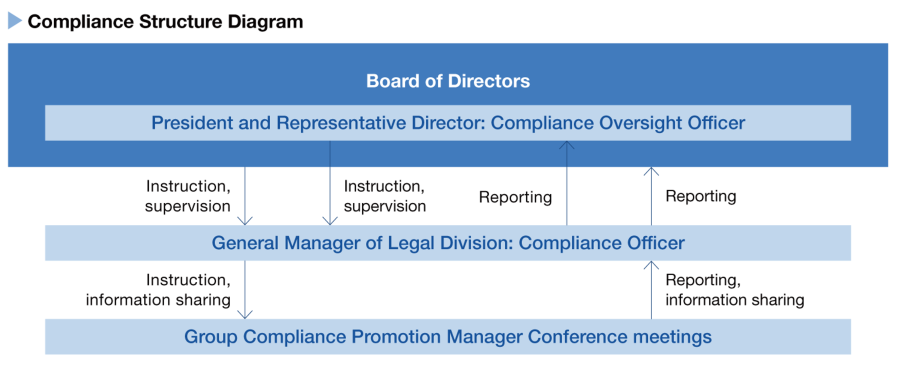
Promotion of group compliance
Our group strives for all officers and employees to comply with laws, social norms, the Charter of Corporate Conduct, Action Principles, and internal rules, aiming to foster a high-ethics corporate culture.
To achieve this, we hold Group Compliance Promotion Manager Conference meetings annually, bringing together compliance officers from group companies. This conference serves as an important opportunity for group-wide information sharing through the reporting of each company’s initiatives and challenges and exchanges of opinions.
In FY2024, we put particular focus on checking compliance with business-related laws and regulations (such as the Antimonopoly Act and Subcontract Act) and the status of harassment-prevention training. Through discussions and exchange of opinions, we strive for further improvements, leading to enhanced quality of group-wide education and training programs.
Development of a whistleblowing system
To detect and correct misconduct at an early stage, our Group has set up desks inside and outside the Company to handle requests for consultation and whistleblowing from officers and employees concerning organizational or personal violations of conduct, laws, or ethics. Our Corporate Ethics Hotline desk outside the Company accepts contact 24 hours a day via the web, creating an environment conducive to anonymous whistleblowing and consultation requests.
Whistleblower reports and consultation requests received at the internal and external desks are delivered by the General Manager of the Legal Division to the Audit and Supervisory Committee (composed of independent directors), after which necessary action is taken. We have established Internal Whistleblowing Regulations stipulating that officers and employees engaging in whistleblowing and consultation requests must not be treated disadvantageously and that their personal information must be protected.
Information regarding the consultation and reporting hotlines is communicated to all group officers and employees each year through CSR training, new employee orientation, and internal manuals, and information received through consultation and reports is used to improve workplaces, implement necessary employee training, and enhance internal systems.
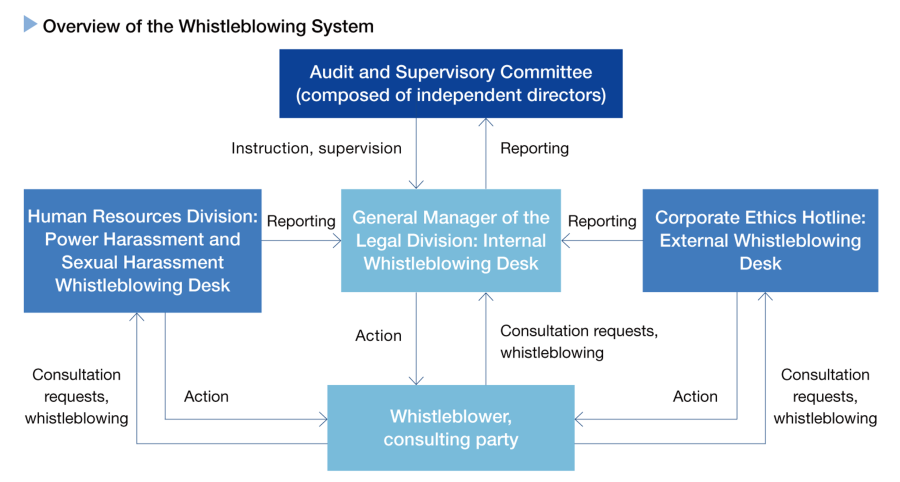
Implementation of CSR education
Every year, we conduct CSR education on antitrust law, security exports, human rights, diversity, harassment, intellectual property rights, information security, and other topics for all employees of the Marubun Group. Through these educational efforts, we strive to foster and raise awareness of compliance among all employees.
■CSR Education Topics
| Human Rights and Labor | Fair Business Practices | Information Management and Risks | Sustainability and Corporate Ethics |
|---|---|---|---|
| ・Human rights, diversity, LGBTQ issues ・Harassment ・Occupational safety and health |
・Antimonopoly Act ・ Subcontract Act ・Prevention of bribery ・ B-to-C transaction laws and regulations ・Intellectual property rights |
・ Information security ・Protection of personal information ・ Insider trading ・Security exports and specified exports |
・Corporate Philosophy ・Sustainability, the SDGs ・The environment, quality, conflict minerals |
■Number of Participants in CSR Education(Consolidated)
| Directors | 17 | 16 | 16 |
|---|---|---|---|
| Employees | 997 | 1,037 | 1,069 |
| Partner companies’ employees |
134 | 149 | 151 |
| Total | 1,148 | 1,202 | 1,236 |
* “Partner company employees” refers to employees of contractors engaged in work at our business sites.
Risk Management
Initiatives for Integrated Risk Management
Our company is building a comprehensive and cross-functional risk control system, centered on the Internal Control Committee, which is chaired by the President and Representative Director and comprises five executive directors and five relevant division heads.
Our risk management process is based on annual risk management plans, with each division monitoring risks quarterly in accordance with plan. Results of monitoring are reviewed by the Internal Control Committee, which verifies the validity of risk assessments and gives necessary corrective or improvement instructions. The effectiveness of this process is objectively evaluated by the Audit Office through internal audits.
If it is determined that a significant loss has occurred or is likely to occur in our business activities, or if there is a significant potential impact on stakeholders, the President will immediately establish an Emergency Response Headquarters in accordance with the Crisis Management Regulations, and the appointed head of the headquarters will quickly initiate response measures to minimize damage to corporate value.
| Internal Control Committee | Committee Chair CEO |
・Determine the Group’s risk management policies and plans ・Implement management reviews and direct necessary corrections and improvements |
|---|---|---|
| Risk Oversight Officer |
General Manager of the Business Administration Division |
・Oversee all activities and management related to risk management ・Evaluate risk management activities and direct necessary corrections and improvements |
| Risk Management Officer |
Director of Corporate Planning Department | ・Oversee the implementation of risk management plans, identify critical risks, and carry out monitoring |
| Risk Manager | Heads of relevant departments in the Company Presidents of affiliate companies |
・Identify risks as the responsible managers of departments/companies ・Formulate and implement risk management plans |
| Risk Management Secretariat |
Corporate Planning Department | ・Promote PDCA in risk management activities |
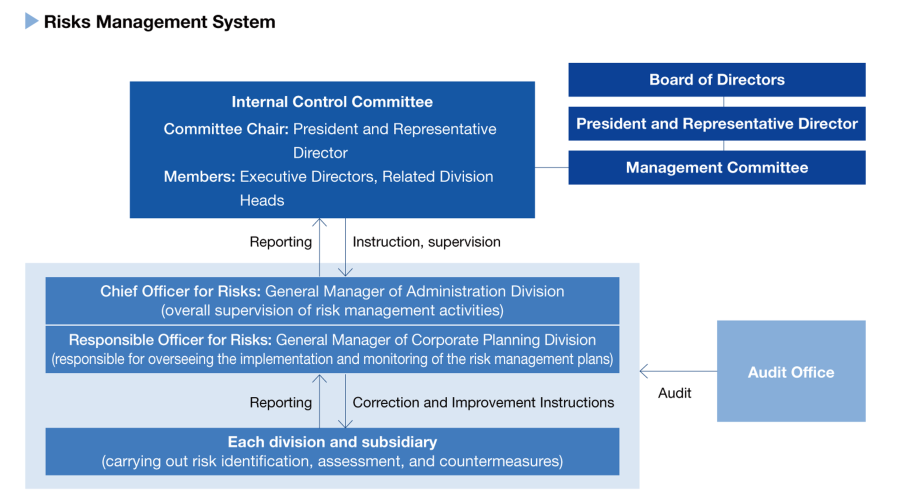
Risk categories
We define risks as “uncertain events that impede the achievement of management objectives.” After classifying them into the nine categories shown below, we evaluate and assess approximately 100 detailed risk management items using a frequency-impact matrix. We monitor and assess these risks according to the risk management plan and strive for early detection and correction to minimize any losses.
In FY2024, due to changes in financial markets from exchange rates and rising interest rates as well as sluggish customer demand, we considered and implemented necessary measures for business risks and market risks.
| Strategic Risks | Risks related to strategy, governance, policy management, business investments, etc. |
|---|---|
| Business Risks | Risks related to products, services, inventories, business partner credit, contracts, marketing, technologies, etc. |
| Financial Risks | Risks related to finance, accounting, taxation, asset procurement and management, etc. |
| Market Risks | Risks related to exchange rates, interest rates, stock prices, etc. |
| Legal and Compliance Risks | Risks related to response to laws and regulations, compliance, ethics, etc. |
| Organizational and Personnel Risks | Risks related to organizational structure, authority and command, labor and personnel management, etc. |
| Information Risks | Risks related to information systems, information security, etc. |
| Asset Maintenance Risks | Risks related to natural disasters, infectious diseases, accidents and malfunctions, etc. |
| Other Risks | Significant risks and foreseen risks other than the above |
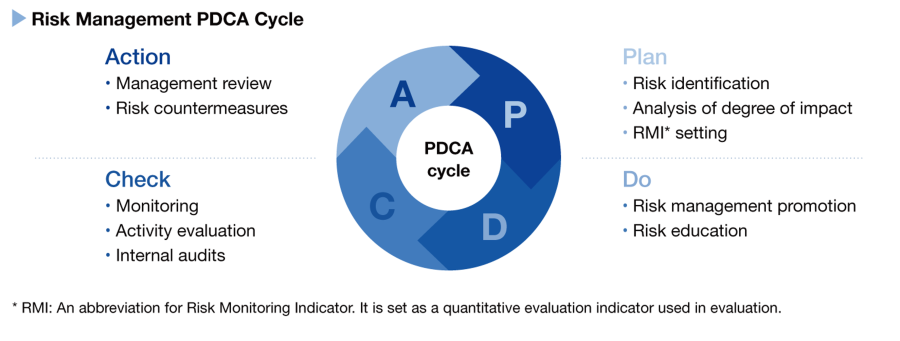
Crisis management
When the Company has identified a crisis or the risk thereof, the Director establishes an emergency task force to enact countermeasures. The task force’s members are the heads of related head office departments, acting under a task force leader appointed by the Director. These matters are stipulated in our Crisis Management Regulations, which are operative at all times.
In the event of a serious crisis, we establish a structure for prompt initial response, share information with the Management Committee and the Boards of Directors, and take action.
Environment & Quality Policy
Practice of Sound Management Activities
We will conduct appropriate business transactions and comply with domestic and foreign laws and regulations.
- Practice of Sound Management Activities
We will conduct appropriate business transactions and comply with domestic and foreign laws and regulations.
- Contribution to environmental preservation
We will implement management that contributes to environmental preservation.
- Improvement of Customer Satisfaction
We will provide products and services that are valuable to our customers and meet their needs and expectations.
- Appropriate management of corporate risk
We aim for long-term, stable growth through appropriate risk management.
We will strive to continuously improve “customer satisfaction” and “environmental protection” based on the above policies.
